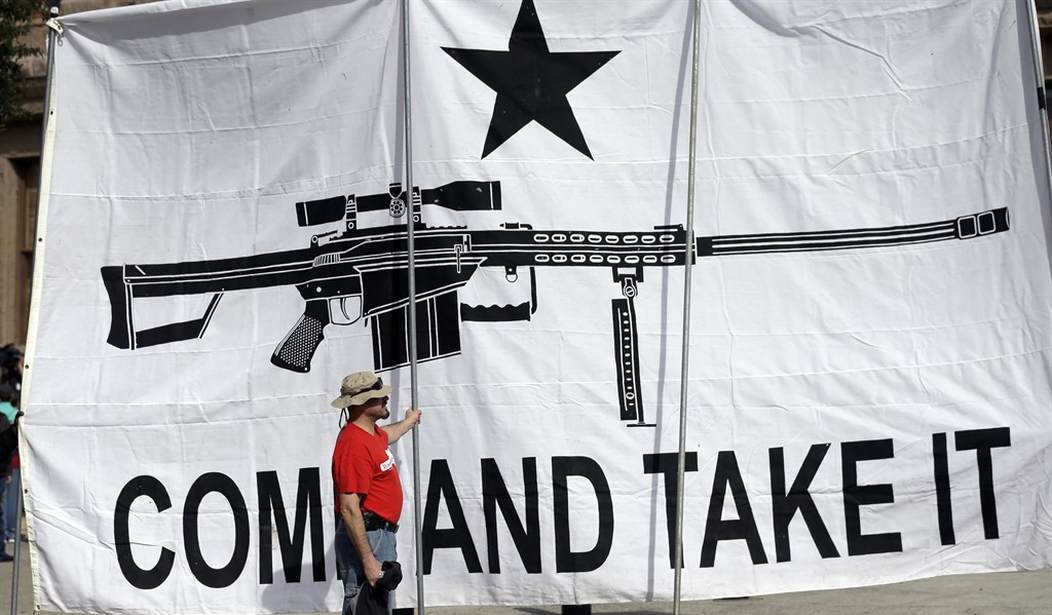Earlier this year a federal judge in Michigan tossed out a lawsuit filed after a third-grader was told to remove a hat emblazoned with an AR-15 and the words "Come and Take It", ruling that the school's actions didn't violate the First Amendment rights of the student, known in legal filings as "C.S."
U.S. District Judge Terrence G. Berg said that while C.S. might have some First Amendment rights while on campus, her young age and the proximity of the elementary school to Oxford, Michigan (where a school shooting had taken place four months earlier) meant school officials had a "reasonable" belief that her ballcap would be disruptive to the learning environment.
C.S.'s father Adam Stroud, backed by the Firearms Policy Coalition, appealed Berg's decision to the Sixth Circuit, and for the past several months the plaintiffs and defendants have been busy exchanging briefs laying out their arguments. In the latest filing, C.S. and her attorneys say the school district is misrepresenting some fundamental facts about the case.
The School Officials subtly but significantly miscast C.S.’s position, which emphatically does not seek protection for “a student’s right to express themselves however, whenever, and about whatever they wish.” C.S. is not advocating for a First Amendment free-for-all at elementary schools. What she does seek, though, is faithful application of Tinker and its progeny. Under that clearly established, settled authority, the School Officials’ speculative, after-the-fact hypothesizing about potential disruption was insufficient to justify their content-based command that C.S. remove a hat they did not like.
While C.S. isn't taking the position that a student has the right to express themselves however, whenever, and about whatever they wish, the school district has taken the position that administrators can suppress speech or expression however, whenever, and about any topic under the sun. As we reported back in April:
Part of the problem is that the school's dress code is so vague that it could allow virtually any picture or words to be banned as inappropriate or disruptive: "Anything printed on clothing must not be offensive in any way. The building principal/staff has the right to decide what is offensive, but some examples are: words/slogans that advertise illegal substances, words/slogans that are racially or religiously offensive, violence themes, vulgar or sexual innuendo, etc."
If the school principal suddenly decided that a shirt emblazoned with George Washington or Donald Trump's face was offensive they could prohibit students from wearing those items, which is absolute nonsense. The FPC-backed brief argues that Judge Berg gave undue deference to school administrators' determination that C.S.'s headwear could be banned because it presented a potential risk of disruption.
... the School Officials point to what the district court called “undisputed evidence supporting their professional judgment.” But on closer examination, that “professional judgment” of which there was “undisputed evidence” is mere gossamer—just School Officials’ subjective, conjectural view that allowing C.S. to wear her hat would cause a “risk of scuffles.”
Allowing such unsupported ipse dixit to establish the “specific and significant fear of disruption” Tinker requires would write that case out of the books, and the First Amendment out of this Nation’s schools. As the Fourth Circuit explained in a highly analogous situation, a student’s T-shirt stating “NRA” and depicting people pointing rifles was protected because “Tinker requires a specific and significant fear of disruption, not just some remote apprehension of disturbance.” “Undisputed” or not, the School Officials’ vague, post facto assertion that they feared that C.S.’s wearing the hat would cause a “risk of scuffles” simply does not clear the bar Tinker sets. School Officials “must present facts that might reasonably have led school authorities to forecast substantial disruption of or material interference with school activities or the invasion of the rights of others.”
There's no indication that C.S.'s choice of hat caused heartburn or concern for anyone other than the administrators who told her to take it off. That's hardly enough evidence of a substantial disruption of school activities to justify the ban, and the right decision for the Sixth Circuit would be reinstating C.S.'s lawsuit against the school district for violating her freedom of expression and allowing the case to proceed to trial.
C.S. isn't the only Second Amendment supporter whose First Amendment rights are under attack. From Big Tech censoring of GunTubers to the demonization of 2A activists in the media, every one of us who believes in a robust right to keep and bear arms runs the risk of being silenced. It's more important than ever that pro-2A voices be heard, and you can help make that happen by becoming a VIP, VIP Gold, or VIP Platinum member of Townhall Media.
You'll get all kinds of great benefits when you sign up, and for a limited time, if you use the promo code POTUS47 you can save a whopping 74% off the regular price of a membership! That's a huge savings, and your membership will be a big help in our efforts to keep the Second Amendment (and the First Amendment too) strong and secure from the anti-gunners and the speech police.









Join the conversation as a VIP Member